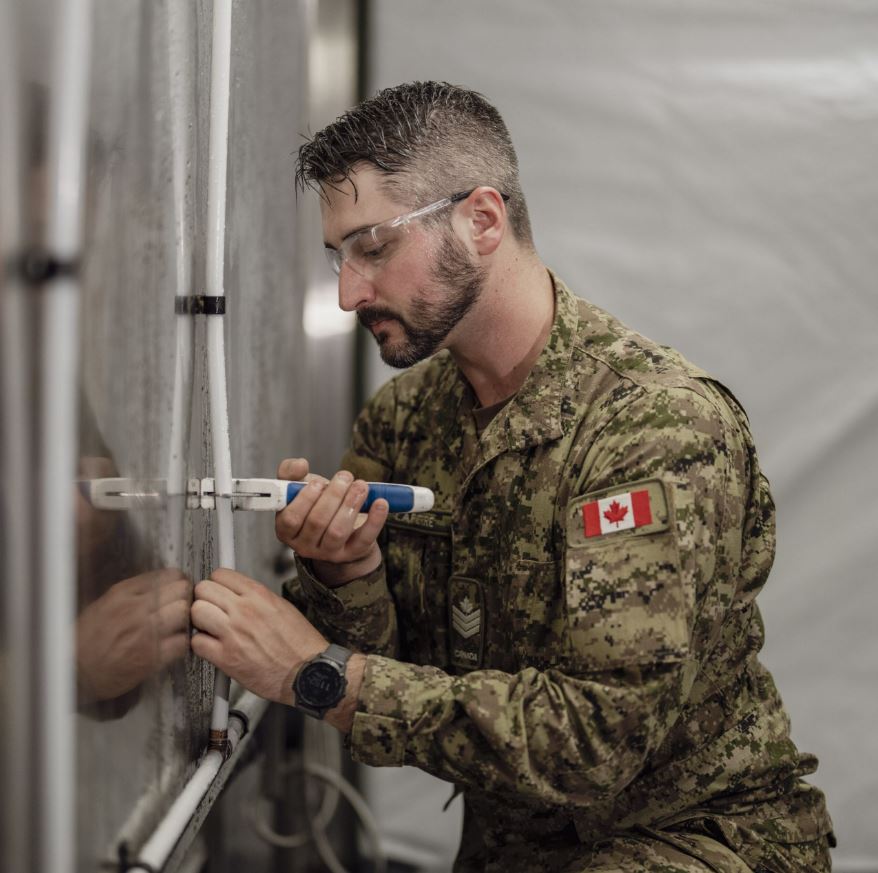
DISCOVER
THE HIGH STAKES WORLD OF A PLUMBING AND HEATING TECHNICIAN.

THE HIGH STAKES WORLD OF A PLUMBING AND HEATING TECHNICIAN.
FOR A LOOK INSIDE THE SKILL, EXPERTISE AND DEDICATION BEHIND THE OCCUPATION.


SERGEANT ALEXANDRE LAPIERRE AS THEY WALK YOU THROUGH A DAY IN THE LIFE.
As a member of the military, Plumbing and Heating Technicians provide plumbing and heating engineering support to operational units at home and abroad.
The Plumbing and Heating Technician job is one of seven Construction Engineering positions involved in the supply of all construction, civil, electrical and mechanical engineering services in support of Canadian Armed Forces (CAF) operations worldwide. The primary responsibilities of the Plumbing and Heating Technician are to:
Plumbing and Heating Technicians often work with the challenges that come with varying environmental conditions. Plumbing and Heating Technicians maintain their skills while employed at home units or on humanitarian operational assignments.
If you chose a career in the Regular Force, upon completion of all required training, you will be assigned to your first base. While there is some flexibility with regards to postings (relocations), accommodations can’t always be made, and therefore, you can likely expect to move at some point in your career. However, if you decide to join the Primary Reserve Force, you will do so through a specific Reserve unit. Outside of training, your chosen Reserve unit will be your workplace on a part time basis, and you will not be obligated to relocate to a different base. As part of the Primary Reserve Force, you typically work one night per week and some weekends as a minimum with possibilities of full-time employment.
The first stage of training is the Basic Military Qualification course, or Basic Training, held at the Canadian Forces Leadership and Recruit School in Saint-Jean-sur-Richelieu, Quebec. This training provides the basic core skills and knowledge common to all trades. A goal of this course is to ensure that all recruits maintain the Canadian Armed Forces (CAF) physical fitness standard; as a result, the training is physically demanding.
Learn more about Basic Training here.
Plumbing and Heating Technicians attend the Canadian Forces School of Military Engineering in Gagetown, New Brunswick. Training takes approximately 22 weeks and includes:
Plumbing and Heating Technicians may be offered the opportunity to develop specialized skills through formal courses and on-the-job training, including:
No previous work experience or career related skills are required. CAF recruiters can help you decide if your personal interests and attributes match the criteria for this occupation.
The minimum required education to apply for this occupation is the completion of the provincial requirements for Grade 10 or Secondary 4 in Quebec, including Grade 10 applied math or math 416 / CST 4 in Quebec.
Foreign education may be accepted.
This position is available for part-time employment with the Primary Reserve at certain locations across Canada. Reserve Force members usually serve part time with a military unit in their community, and may serve while going to school or working at a civilian job. They are paid during their training. They are not posted or required to do a military move. However, they can volunteer to move to another base. They may also volunteer for deployment on a military mission within or outside Canada.
Plumbing and Heating Technicians will serve with the Royal Canadian Air Force supporting all three environments. They are employed to provide plumbing and heating engineering support for Forces training and operations. Those employed on a part-time or casual full-time basis usually serve at a military base, wing or unit located within Canada.
Find a Recruiting CentreReserve Force members are trained to the same level as their Regular Force counterparts. They usually begin training with their home unit to ensure that they meet the required basic professional military standards. Following basic officer training, the home unit will arrange for specialized skills training. Plumbind and Heating Technicians train for their qualification at the Canadian Forces Training Development Centre in Borden, Ontario.
Reserve Force members are trained to the same level as their Regular Force counterparts. They usually begin training with their home unit to ensure that they meet the required basic professional military standards. Following basic military training, occupational training for Plumbing and Heating Technicians takes approximately 22 weeks and is conducted at the Canadian Forces School of Military Engineering in Gagetown, New Brunswick.